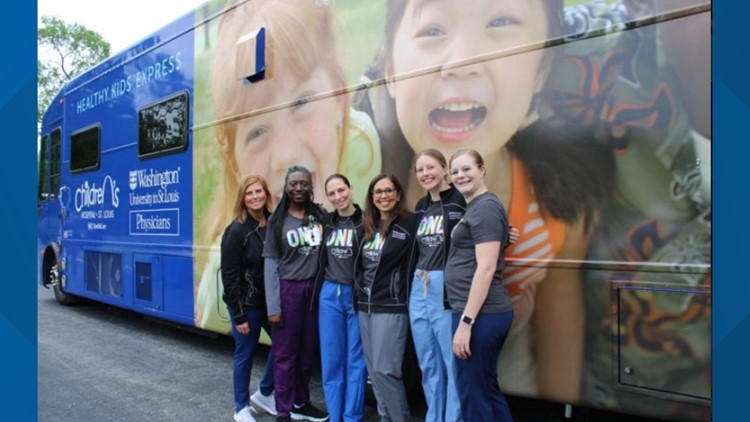Successful diabetes management requires ongoing education, support, and resources from a medical team.
The Healthy Kids Express Diabetes Mobile Unit, a collaborative effort between St. Louis Children’s Hospital and Washington University School of Medicine, brings this important care directly to children who need it most.
“I want to make sure that you recognize that pediatric diabetes is actually one of the top chronic diseases affecting children nowadays [and] the numbers are rising,” Dr. Ana María Arbeláez, chief of the Children’s Hospital division of pediatric endocrinology and diabetes, said.
“We understand as a pediatric project, and as pediatricians, that successful self-management of diabetes is critical to prevent both short and long-term life-threatening complications.”
The first-of-its-kind mobile pediatric diabetes unit provides accessible, comprehensive, and individualized health care to the most vulnerable children and adolescents in the region who are living with diabetes and diabetes risk.
“This is truly a magical bus,” Arbeláez said. “Thanks to all of our partners and friends [from] St. Louis Children's Hospital, and to the Washington University School of Medicine, which have committed to establishing this diabetes mobile unit to provide healthcare to the most vulnerable children, and adolescents living with diabetes, pre-diabetes and obesity in a region.”
Each week, the mobile unit travels throughout the community visiting schools, including Hoech Middle School, allowing staff to provide follow-up visits as well as education about prevention, nutrition, and disease management.
“I think it's the embodiment of partnership; St. Louis Children's Hospital and Washington University School of Medicine, our department of pediatrics, have a longstanding history of working together, and so we're definitely very used to solving for these types of clinical needs,” Tesh Jewell, Vice President of Ambulatory & Clinical Support Services at St. Louis Children’s Hospital, said.
“It’s amazing when you can really embrace our community leaders and partners, our foundation partners, and really start to say, here's what we would like to achieve, and watch all of these different individuals contribute in such a meaningful way.”
It is vital to educate children on diabetes because its impact on the African American community is often twice that of other groups of Americans.
According to the Department of Health and Human Service Office of Minority Health:
The Healthy Kids Express Diabetes team is already underway in the community. Nurses are embedded with community health workers in schools where kids have the highest diabetes risk. Also, more than 250 school nurses with advanced training in the identification and management of kids with diabetes or pre-diabetes engage in the initiative.
“For just a few minutes today, we get to pause, be present, and recognize the magnitude that we can accomplish together through our collective efforts through a shared vision,” Jewell said. “We are able to bring necessary diabetes care to our community's children, significantly improving lives so that they can learn, grow, and simply be kids.”
St. Louis Children’s Hospital’s Healthy Kids Express program is part of BJC HealthCare’s commitment to community health improvement, an initiative that seeks to eliminate health disparities in the region by providing education, resources, and support to communities that have historically been under-resourced.
Dr. Chris Kilbride, Ritenour School District superintendent, said, “we have three goals in the Ritenour School district: every child meeting their personal academic goals, 100% of students being prepared for college and career, and then students meeting the 90% attendance standard.
“We know that if students are not well, if we don't have the wraparound support, whether it be food insecurity, whether it be pediatric health, whether it be mental health, we won't reach our district goals.”
He also spoke about the power of partnership, which is bringing resources to the community.
“This partnership is critical in our work to support every student every day, and I'm just so thankful to live and work in a community where we're committed to meeting all those needs,” Kilbride said.
“The board has bought into serving the whole child. The district leadership has bought in to serving the whole child as we're pushing for academic gains. If students and families cannot get to the medical services, then why are we not bringing those services to them? I just appreciate all that you've done.”


